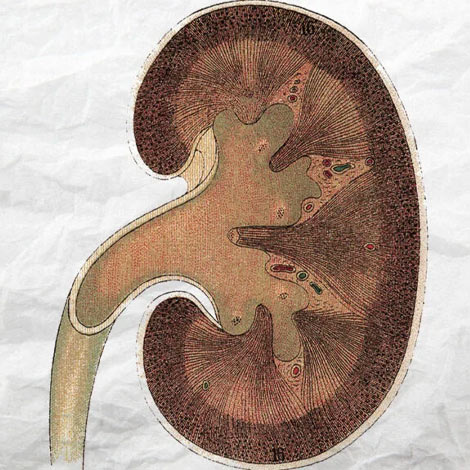Kidney Failure Treatment in Vijayawada
What is Rapidly Progressive Renal Failure?
Rapidly Progressive Renal Failure (RPRF), also known as rapidly progressive glomerulonephritis (RPGN), is a severe and swiftly progressing kidney condition that can lead to permanent kidney damage within weeks or months if left untreated. This condition involves inflammation of the glomeruli — the tiny filtering units in the kidneys — leading to a rapid decline in kidney function.
At Veda Hospital & Kidney Centre, under the expert care of Dr. M.V. Viswanath, patients with critical kidney conditions receive personalized and advanced care. Recognized as a leading Kidney Failure Treatment Doctor in Vijayawada, Dr. Viswanath focuses on early diagnosis and aggressive intervention to prevent irreversible kidney failure.

Understanding the Mechanism of RPRF
In RPRF, the kidneys become inflamed due to an abnormal immune response. The inflammation results in crescent-shaped scars in the glomeruli, impairing their function. These changes can be identified on kidney biopsy and require immediate treatment to halt progression.
Types of Rapidly Progressive Renal Failure
- Type I – Anti-GBM Disease: Caused by autoantibodies targeting the glomerular basement membrane. May present with pulmonary hemorrhage (Goodpasture’s syndrome).
- Type II – Immune Complex Mediated: Common in lupus nephritis, IgA nephropathy, or post-infectious glomerulonephritis.
- Type III – Pauci-immune: Often associated with ANCA (Anti-neutrophil cytoplasmic antibodies) vasculitis. Lacks significant immune complex deposits.
Causes of Rapidly Progressive Renal Failure
RPRF may occur due to various underlying medical disorders. Identifying the cause is essential for tailored treatment:
- Autoimmune diseases (Lupus, Vasculitis)
- Goodpasture's syndrome
- Post-infectious glomerulonephritis
- IgA nephropathy
- Wegener’s granulomatosis
- Drug-induced nephritis
- Rapidly progressing hypertension or diabetes complications
Symptoms of Rapidly Progressive Renal Failure
RPRF can appear suddenly and worsen within days to weeks. Symptoms include:
- Swelling in legs, face, or abdomen
- Decreased or no urine output
- Blood in urine (hematuria)
- Foamy urine (proteinuria)
- Fatigue and weakness
- High blood pressure
- Nausea and vomiting
- Shortness of breath (fluid overload)
Diagnosis of RPRF
Early diagnosis is critical to prevent permanent damage. At Veda Hospital & Kidney Centre, diagnostic evaluations include:
- Blood tests: Serum creatinine, urea, electrolytes
- Urinalysis: Protein, red blood cells, casts
- Autoimmune markers: ANA, ANCA, anti-GBM
- Kidney ultrasound
- Renal biopsy (confirms diagnosis and type)
Treatment Options at Veda Hospital & Kidney Centre
Under the guidance of Dr. M.V. Viswanath, a top Kidney Failure Treatment Doctor in Vijayawada, treatment protocols aim at halting disease progression and preserving kidney function:
- Immunosuppressive therapy: Steroids and cytotoxic drugs to suppress the immune system
- Plasmapheresis: Removes antibodies from the blood in cases like anti-GBM disease
- Dialysis: For patients with critical kidney function loss
- Kidney transplant: If irreversible kidney damage has occurred
Veda Hospital & Kidney Centre is regarded as a trusted Kidney Failure Treatment Hospital in Vijayawada for managing advanced renal conditions with compassionate care and up-to-date clinical protocols.
Prognosis and Recovery
The outlook for patients with RPRF depends on early diagnosis and treatment. Prompt medical intervention can stabilize or reverse kidney damage. However, delayed treatment may lead to permanent kidney failure requiring lifelong dialysis or transplantation.
Why Choose Dr. M.V. Viswanath?
- Expertise in diagnosing and managing complex renal disorders
- State-of-the-art renal care at Veda Hospital & Kidney Centre
- Patient-centered approach for faster recovery and better outcomes
- Recognized as a leading Kidney Failure Treatment Doctor in Vijayawada
FAQs About Rapidly Progressive Renal Failure
Is rapidly progressive renal failure reversible?
In some cases, especially with early treatment, kidney function can improve. However, late-stage RPRF may cause irreversible damage.
How quickly does RPRF affect kidney function?
Kidney function can deteriorate within days to weeks, making it a medical emergency.
Can RPRF occur in previously healthy individuals?
Yes. While it commonly affects those with underlying autoimmune diseases, it can also appear in healthy individuals after infections or due to drug reactions.
What are the early warning signs of RPRF?
Swelling, decreased urine output, and dark or bloody urine are early indicators that need urgent evaluation.
Is dialysis always required in RPRF?
Not always. If diagnosed early, many patients respond to medications. Dialysis may be needed if kidney function drops drastically.
How is the cause of RPRF identified?
Through lab tests, autoimmune markers, imaging, and kidney biopsy, the underlying cause can be determined.
Is a kidney biopsy risky?
It’s a safe procedure performed under local anesthesia and guided by ultrasound, with minimal complications.
Can RPRF recur after treatment?
If the underlying autoimmune or inflammatory condition is not controlled, recurrence is possible. Lifelong monitoring is essential.
How can one prevent rapidly progressive renal failure?
Managing underlying conditions like lupus, avoiding nephrotoxic drugs, and regular kidney function tests can help prevent RPRF.
Rapidly Progressive Renal Failure is a critical and fast-advancing condition requiring prompt diagnosis and aggressive treatment. With the expertise of Dr. M.V. Viswanath and the specialized infrastructure at Veda Hospital & Kidney Centre, patients in and around Vijayawada have access to the best care. As a trusted Kidney Failure Treatment Hospital in Vijayawada, the center provides comprehensive support for patients battling kidney disease.
If you or a loved one experience signs of kidney failure, seek immediate help from a qualified Kidney Failure Treatment Doctor in Vijayawada like Dr. Viswanath to safeguard your health and future.
Best healthcare providers

Unmatched Nursing Support

Top-notch Patient Care

Hospitable environment

Phenomenal intervention

